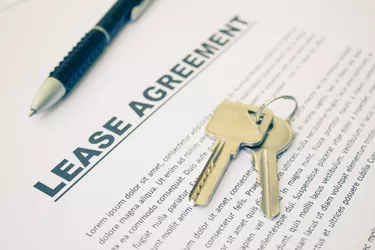
You might need to get out of an apartment lease early because of problems with neighbors, health issues, safety concerns or job loss. Under the best of circumstances, you and the landlord will come to an agreement that lets you break the lease with minimal cost to you. Under less favorable circumstances, you could owe fees and rent and forfeit your security deposit.
Check Your Lease
Video of the Day
Review the terms of your lease agreement for an opt-out clause. Leases that include this provision allow you to end your lease early if you pay a termination fee. The early-termination fee varies, but it can amount to several days' or several months' worth of rent. If the fee is one month's rent, it may be cheaper and less risky to pay the fee rather than wait for the landlord to re-rent the property or charge you for the full remainder of your lease term. Both of the latter scenarios could amount to several months' worth of rent.
Video of the Day
Communicate With Your Landlord
Give your landlord as much notice as possible before your move-out date. Provide at least the minimum amount of notice required by your state's landlord-tenant law or your lease agreement. Write the landlord a notice to vacate letter. Include the following information:
- Date letter is written.
- Your landlord or property management company's name.
- A clear and concise explanation of why you must get out of the lease early.
- Your name, apartment address and contact information.
- New forwarding address.
- Your signature.
Negotiate an Early Termination
To get out of an apartment lease with minimal or no monetary penalty and on good terms, you might need to offset some of the landlord's cost and hassle of re-renting the apartment. You can do so by offering to:
- Pay the advertising costs to find a new renter.
- Actively market and search for a qualified renter to replace you.
- Open the apartment to prospective tenants and maintain the unit show-ready for easy viewing.
- Professionally clean and paint -- or cover the costs to prepare -- the apartment for new tenants.
Offer to Sublease
If your lease doesn't contain a provision allowing you to sublet the apartment to a third party, ask the landlord if he'll agree to a sublease. You must find a qualified renter to take over the apartment and follow all terms of the existing lease you have with the landlord. A sublet doesn't release you from your lease. Instead of paying rent directly to the landlord, the new tenant, or sublessee, pays rent to you. You remain financially liable for any missed rent or damage caused by the sublessee. The Law Depot recommends getting a separate sublease agreement between you and the sublessee in writing.
Consult an Attorney or Renter's Advocate
Certain renters' rights provide you with a way out of your lease for serious circumstances beyond your control, such as:
- You're called to active military duty, or in some states, you must relocate for military reasons.
- Your apartment is damaged by a natural disaster or criminal activity.
- Your landlord fails to make necessary repairs that affect the apartment's habitability or the landlord invades your privacy.
If you are unsure whether your particular situation meets legal grounds for early termination, consult a real estate attorney. You can also seek advice from nonprofit organizations and government agencies that assist renters.